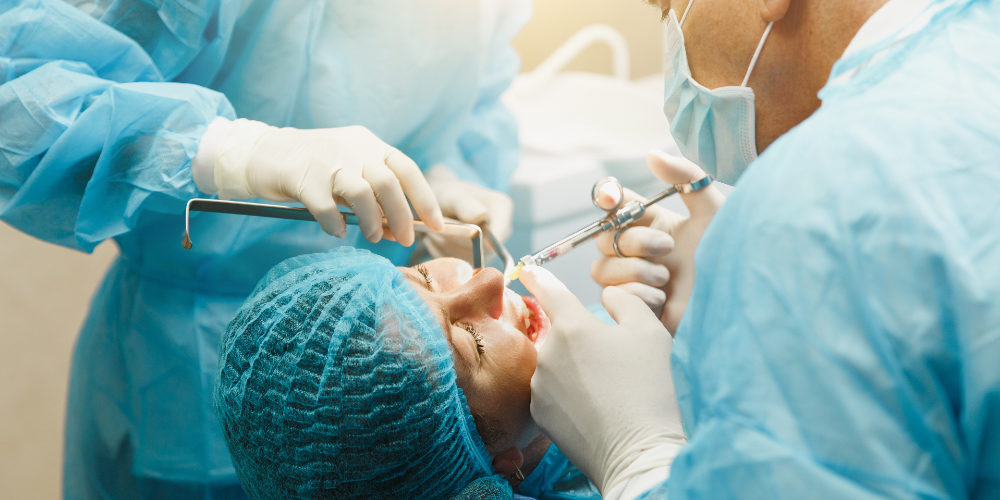Oral cancer is the most common type of cancer that occurs in either the head or neck. Treatment for mouth cancer can vary based on the progression and stage of the disease, along with other factors of an individual’s age and health. Cancer patients are best treated under the care of a professional oncologist or specialist with surgical solutions, radiotherapy, or chemotherapy.
The treatment and recovery process for mouth cancer can vary from one person to another, meaning that each patient needs individualized care. At Rockland Dental Specialists, our dental team is experienced and equipped to manage complex medical ailments and oral diseases while providing expert state-of-the-art dental care.
Understanding the Treatment Options for Mouth Cancer
In the earliest stages of oral cancer, interventions can help stop the spread or worsening of abnormal cells. The spreading, or metastasis, of oral cancer, can damage other organs and body functions as well, but getting treatment early may change the outcome. Regardless of the stage you might be in, your oncologist, surgeon, and dentist make up a strong care team in treating oral cancer. They can help mitigate symptoms and also work to help you recover.
Treatment methods may vary depending on the form of mouth cancer, what stage it’s in, and other factors. Some of the available treatment options for mouth cancer may include:
Surgical Solutions
Depending on the type of cancer, your age, and your general health, your care team may advise surgical solutions in order to remove the affected area. After biopsies, tests, and preparation, surgical intervention may involve the following surgeries in treating cancer:
- Tumor surgery: Removal of a tumor or cancerous growth.
- Glossectomy: Partial or total removal of the tongue.
- Mandibulectomy: Surgery for cancer affecting the jaw.
- Maxillectomy: Surgery for cancer involving the roof of the mouth.
- Neck and lymph nodes: Metastasized cancer may include neck or lymph node surgery.
Surgical solutions can vary based on the type of cancer you have, along with the area of your affected oral cavity. In some cases, cancer that has spread involves more complex surgery to reach other affected organs or body areas.
Radiation Therapy
Radiation therapy involves using intense energy beams to target cancer cells. This can help inhibit growth, or potentially even kill the cells altogether. At times, radiation therapy is combined with other treatment options, such as medication. Radiation is commonly used to treat varying stages of cancer, and different techniques are used to target cancer within the body strategically. Each therapy session is generally completed quickly, and a healthcare team monitors individuals throughout the process.
Chemotherapy
In chemotherapy, anti-cancer drugs target cancers in the oral cavity by shrinking or eliminating the presence of abnormal cells. Chemotherapy may also be combined with radiation therapy, and individuals are monitored by their healthcare team throughout treatment. Radiation and chemo may affect the oral cavity differently, such as causing dry mouth or tooth decay.
Your dentist may perform a biopsy of abnormal growths or use special screening tests for oral exams. If you are diagnosed with mouth cancer, you may best understand your treatment options by speaking with an oral cancer specialist. Additionally, your dentist can follow up and continue your oral care and hygiene and provide dental services throughout the treatment process.
What to Know About Post-op Oral Care and Recovery
The oral cavity is essential for eating, speaking, and maintaining various other aspects of a person’s function and mobility within the head and neck. If an individual is affected by oral cancer and has completed treatment, it’s essential to understand the crucial aspects of post-operative care and recovery. Post-operative care and rehabilitation after oral cancer may involve:
- Speech and swallowing therapy
- Lifestyle changes such as smoking cessation
- Reconstructive surgery of the mouth, tongue, or jaw
- Dental exams and routine oral hygiene appointments
- Eating and nutrition services after the loss of teeth or taste
Undergoing cancer therapy for head and neck cancers can cause challenges for those affected. Due to the nature of mouth cancer and the affected areas, cancer patients may undergo varying changes in speaking, eating, oral health, and maintaining the function of the oral cavity. Despite these challenges, your professional healthcare team, including your dentist, may help you in the early discovery of cancer, rehabilitation, follow-up care, and maintenance of oral health.
Visit Rockland Dental Specialists for Specialized Dental Care in New City, NY
When an individual suffers symptoms and abnormalities of the gums, tongue, or another aspect of the mouth, consulting with a specialized dentist can help look for oral cancer and potentially help spot the signs early on. If you’re diagnosed with oral cancer and are in the treatment process, your surgeon, oncologist, and dentist are essential to your care team.
At Rockland Dental Specialists, we understand the complexity of various medical conditions affecting the oral cavity, including mouth cancer. As part of your care team, our specialists can help you maintain oral hygiene, evaluate the health of your teeth and gums, and provide other dental services you may require. Complete a contact form or call us at (845) 400-9205 to request an appointment.







